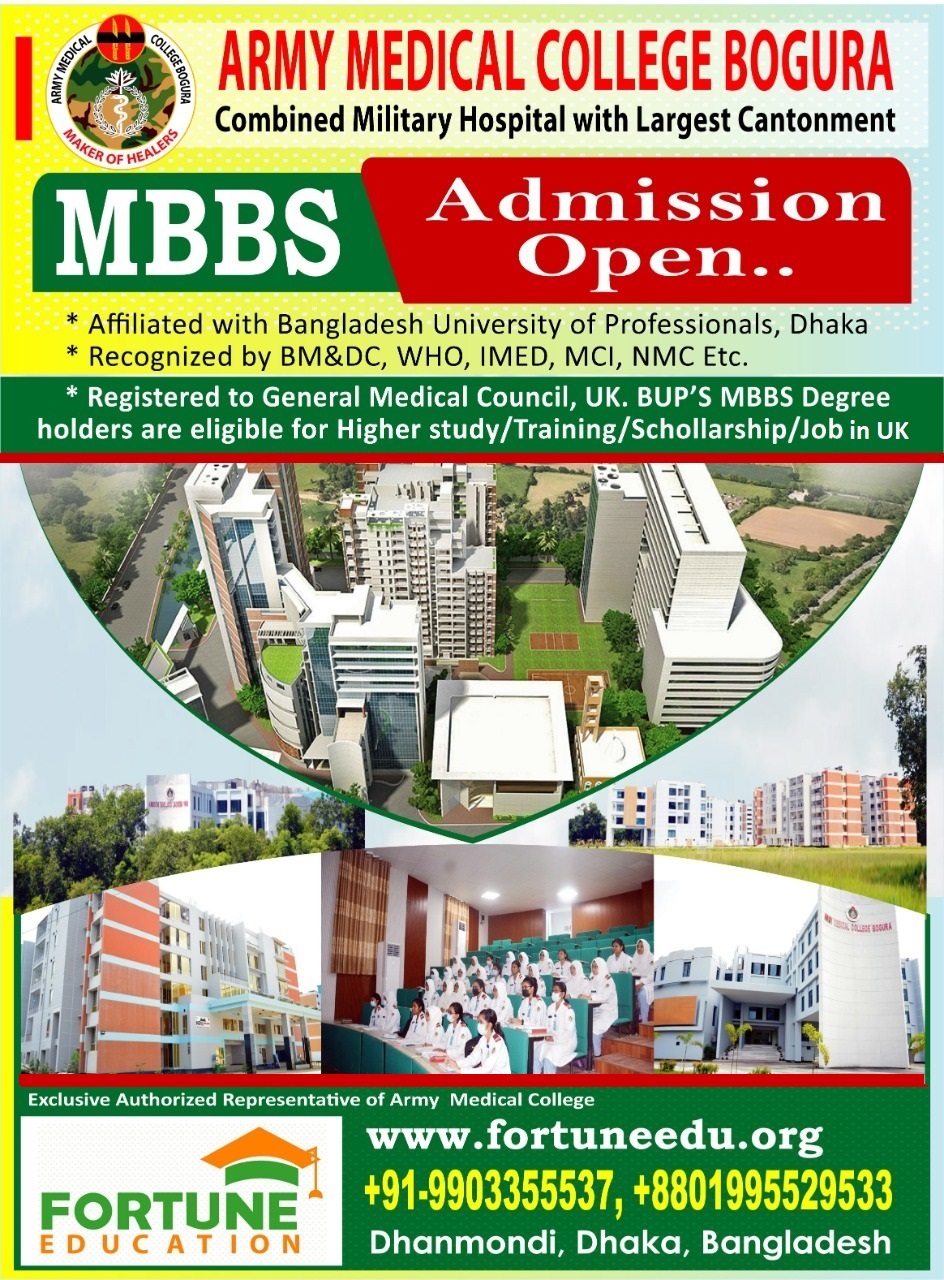MBBS in India is the significant choice for undergraduates to pursue a medical education. There are total 335 medical colleges in India out of which 180 are the private institutions and 155 are government institutions. The curriculum contains practical knowledge and training of clinical procedure. MBBS in India have a highest ranked in course of training and research programmed.
MBBS Admission in India
For applying MBBS in India, students should have to clear NEET Entrance Exam. All the students who are seeking MBBS in India would get NOC (No Objection Certificate) after clearing the entrance exam.
For government seats, state level counseling is done by desired authorities of respective organizations. MBBS in India is the best option for health Practitioners who want to be either physician and surgeon.
The degree awarded after completing the MBBS course is “Bachelor of Medicine” or “Bachelor of Surgery”.
The duration of MBBS course in India is 5.5 years including 1-year paid internship. The affiliation and accreditation of MBBS course in India is done by National Medical Commission (NMC) and Government Authorities of India.
MBBS in India: Quick Overview
| Basic Eligibility | 10+2 Science (PCB) with good score |
| NEET Exam | Required, it is compulsory with good scores |
| IELTS & TOEFL | Not Required |
| Minimum Course Fee | Rs.4 Lakhs/Year |
| Maximum Course Fee | Rs.15 Lakhs/Year |
| Cost of Living in India | Rs.9 Thousand/Month |
| Course Duration (in Years) | 5.5 + 1 Year Internship |
| Recognition of University | NMC & WHO Approved |
| Medium of Education | English Language |
| Top Medical University | All India Institute of Medical Sciences (AIIMS) |
| Climate Condition | Hot, Cold and Rainy |
MBBS in India at a Glance
| Intake | September |
| Minimum Percentage | 60% in PCB for General 40% for SC/ ST and Reserve Categories |
| NEET | Yes With Qualifying Marks |
| IELTS / TOEFL | Not Required |
| Processing Time | 45-60 Days |
| Lowest Fees | 4,00,000 INR Per Year (Pvt. Colleges) |
| Maximum Fees | 15,00,000 INR Per Year (Pvt. Colleges) |
| Living Cost | 7500 INR Per Month |
| Duration | 4.5 Years |
| Medium | English, Hindi and Regional |
| Top Universities | All Government University |
| Recognition | NMC and WHO approved |
MBBS Seats in India
As per the survey of Times of India, published on June , the academic year (2021-22) is the most prominent year for the addition of medical seats in top Government as well as Private colleges in India. This year, around 2800 medical seats are reserved in 25 government medical colleges.
The MBBS admissions are conducted through NEET examinations across the country. The NEET program provides entry to 70,693 MBBS seats and 26,693 BDS seats in India.
The medical aspirants can check all the details related to MBBS seats in India as mentioned below:
| Types of Colleges | MBBS Seats | BDS Seats |
| Government Colleges | 36,863 | 3,513 |
| Private Colleges | 33,830 | 23,260 |
| AIIMS & JIPMER Institutions | 1405 | – |
| Grand Total | 72,098 | 26,773 |
List of Number of Medical Colleges in India (Private & Government)
| States | Number of colleges
Providing MBBS course |
Private Colleges | Government Colleges |
| Andhra Pradesh | 27 | 12 | 15 |
| Assam | 6 | 6 | 0 |
| Bihar | 11 | 7 | 4 |
| Chandigarh | 1 | 1 | 0 |
| Chhattisgarh | 9 | 6 | 3 |
| Delhi | 7 | 5 | 2 |
| Goa | 1 | 1 | 0 |
| Gujrat | 22 | 9 | 13 |
| Haryana | 6 | 2 | 4 |
| Himachal Pradesh | 2 | 2 | 0 |
| Jammu and Kashmir | 4 | 3 | 1 |
| Jharkhand | 3 | 3 | 0 |
| Karnataka | 43 | 11 | 32 |
| Kerala | 24 | 6 | 18 |
| Madhya Pradesh | 11 | 5 | 6 |
| Maharashtra | 43 | 19 | 24 |
| Manipur | 2 | 2 | 0 |
| Mizoram | 1 | 1 | 0 |
| Odisha | 6 | 3 | 3 |
| Puducherry | 9 | 2 | 7 |
| Punjab | 9 | 3 | 6 |
| Rajasthan | 10 | 7 | 3 |
| Sikkim | 1 | 0 | 1 |
| Tamil Nadu | 42 | 19 | 20 |
| Telangana | 24 | 7 | 17 |
| Tripura | 2 | 1 | 1 |
| Uttar Pradesh | 27 | 12 | 15 |
| Uttarakhand | 4 | 2 | 2 |
| West Bengal | 14 | 13 | 2 |
| South India | 154 | 52 | 102 |
| West India | 77 | 34 | 43 |
| North India | 70 | 37 | 33 |
| East India | 47 | 37 | 10 |
| Total | 348 | 160 | 188 |
Why MBBS in India?
- Medical universities in India are some of the finest and prominent ones in the world.
- There are over 300 medical universities and colleges in India. Out of these, around 180 are private colleges.
- There is a total of approximately 72,098 seats available in India.
- MBBS in India is ranked higher due to its excellence in research and training programs.
- Indian medical colleges are famous for providing excellent clinical knowledge and expertise.
- Students have the advantage of attending international seminars and conferences.
- The syllabus followed in Indian medical college is of global standard.
- Students are free to practice in any part of the world after MBBS from India.
- Students get to practice on actual human bodies.
Duration of MBBS in India
- MBBS in India has a tenure of 5.5 years. It includes 4.5 years of classroom study, and the last year is for an internship.
- For a postgraduate program, you will need a time of 3 years.
- Diploma courses take two years to conclude.
- Other specialization programs take specific times.
Eligibility Criteria for MBBS in India
- The candidate must be of 17 years of age at the time of MBBS admission in India.
- The candidate must not exceed the age of 25 years.
- The medical candidate needs to score 50% marks in 12th grade for general category students. Reserved category candidates must achieve a minimum of 40%.
- For AIIMS, the percentage is 60% and 45% for SC/ST and OBC.
- A medical candidate must have the primary subjects in 12th grade should be Physics, Chemistry, and Biology.
- NEET is mandatory.
- Other entrance exams which a medical candidate can appear for- JIPMER or AIIMS entrance tests, Kerala CEE, Karnataka CET, etc.
Documents Required for MBBS in India
Medical candidate must keep all the following documents ready for seeking MBBS admission in India:
- Medical candidates must possess valid mark sheets of class 10th and class 12th.
- NEET scorecard is an essential requirement for getting admission to MBBS India.
- Medical candidates must possess a valid school transfer certificate, code of conduct certificate, medical certificate, health check-up certificate, and no criminal record certificate.
- Having a passport and passport size, photocopies are also one of the requirements.
- The students should have a caste certificate indicating that the medical candidate belongs to SC/ST/OBC.
- Medical candidate needs to show parents’ bank statement, which indicates that he/she will be able to pay the fees required during admission.
Documents Required for Counselling of MBBS in India
The Candidate Should bring his/her following original documents along with attested photocopies of certificates for admission in MBBS/BDS Course in INDIA.
- CLASS 10th Marks Sheet
- CLASS 10th Certificate(For date of Birth)
- Class 12th Marks Sheet
- Class 12th Certificate
- NEET Admit Card and Result/Rank letter issues.
- Eight (8) Passport Sized photographs (Same as the one affixed on application Form).
- Proof of Identity(ID Proof)
- Category Certificate(If Applicable)
 Process of Admission for MBBS in India
Process of Admission for MBBS in India
- You must complete Class XII with Physics, Chemistry, and Biology.
- The student must qualify in NEET for admission in MBBS.
- After qualifying for the NEET exam, students must appear for counseling.
- There are some other exams as AIIMS, JIPMER for medical college admission.
- Students can also appear for the entrance examination for seven AIIMS.
Advantages of MBBS in India
- India is ranked among the top medical, educational facilities in the world.
- During MBBS in India, students get to learn about tropical diseases. They study some of the rare diseases which don’t exist in other foreign countries.
- At the time of internships during MBBS in India, medical students get to face a real-life experience.
- Every state has state-funded medical universities.
- The Indian MBBS degree is accepted worldwide.
- Exams like IELTS & TOEFL are not required.
- India is a populated country, the need for doctor increase by the day.
- Students get to experience modern technologies of medical science.
- There are excellent postgraduate and specialization opportunities.
Disadvantages of MBBS in India
- The biggest drawback is that without an excellent NEET result, the seats of government medical colleges will not be available for you
- Medical students don’t get to experience a global exposure
- For pursuing MBBS in india, medical candidates need to qualify a few entrance exams which are mandatory.
- If you unable to clear any of the entrance exams, it becomes difficult to seek admission in any of the govt universities
- Private medical colleges in India are very expensive. The private colleges charge hefty tuition fees
- Private medical colleges also charge donations or capitation fees at the time of MBBS admission in India
- Medical candidates don’t get the opportunity to discover new cultures or learn any new language
- Medical universities in foreign countries have a good infrastructure as compared to that of medical universities in India.
- There is a huge demand for MBBS in India.
- The seats are limited
- There are very few Govt. medical colleges in India thereby limiting the number of seats in the medical sector.
Syllabus for MBBS in India
| Year | Semesters | Subjects Covered |
| Phase I | 1ST – 2ND Semester | Pre-Clinical Subjects – Human Anatomy, Bio-chemistry, and Physiology, Bio-Physics, Biochemistry, and introduction to Community Medicine Humanities. |
| Phase II | 3rd, 4th & 5th Semester | Para-clinical and Clinical subjects – Community Medicine, Forensic Medicine, Clinical postings in wards, OPDs, Pathology, Pharmacology, and Microbiology |
| Phase III | 6th – 9th Semester | Continuation of study of clinical subjects – Community Medicine, Obstetrics and Gynaecology, Medicine and Allied subjects (Psychiatry, Dermatology), Surgery and Allied subjects (Anesthesiology, ENT, Ophthalmology, Orthopedics), Paediatrics, andClinical Postings |
| Internship | Community Medicine, Surgery including Orthopedics, Medicine, Welfare Planning, Paediatric, Obst. / Gynae. Including Family, Ophthalmology, Otorhinolaryngology, and Casualty |
MBBS in India for International Applicants
- Govt. of India has some reservations of seats for the Non-resident Indian (NRI) students and the students arriving from other countries.
- Even NRI medical students can bag admissions in private and govt institutions.
- NRI students can apply through the offices of diplomatic consultants, which are available in India.
- Indian Embassy can offer more accurate and exact information needed by the NRI students.
- In some situations, entrance tests are not required by NRI students.
- Reserved NRI quota seats, which offer admission to International students.
- In the NRI quota, too, the seats are allotted based on merit and performance.
- Fees structure may vary for the NRI students in the medical council-approved colleges.
What is the Major Difference in Doing MBBS in India and MBBS Abroad?
- The course duration: all the medical universities outside India have an academic curriculum that for 6 years comprises of 5 years of theoretical study and one year of internship. For MBBS in India, this curriculum is for 5.5 years which 4.5 years of study and one year of internship.
- The course fee: Indian government colleges do not charge for a hefty fee structure as compared to the Indian private medical colleges. As for the medical colleges abroad, they do not ask for donations and the academic fee per year is less than that of the Indian private medical institutions.
- The reputation: not many of the Indian medical colleges are listed in the top medical colleges ranking in the world. Even AIIMS, Delhi, India’s top medical college is not there in the top 100 medical colleges in the world. In such a situation, it is better to be associated with a medical college abroad than going to a private medical institution.
- Personality development: living outside India will inculcate a good personality within you owing to the global exposure that you will receive. You will become more learned and experienced when you study MBBS abroad as compared to India.
- The NMC Screening Test: if you want to return after your MBBS abroad to India, you will have to appear for the NMC Screening Test also called as the FMGE to obtain the license for practicing medicine in India. When you study from any medical college in India, you are provided with a license after your graduation without any need for sitting for an examination.
- The global exposure: when you go to studying medicine abroad, you will meet a lot of new people from different countries and you learn their culture as well. This helps in providing you a global exposure for better personality development.
- Clinical knowledge: India has a growing population and so the hospitals are flooded with patients every single day. You will indeed get a good level of clinical knowledge while studying and practicing in India, but you can get into new researches and development whilst studying MBBS abroad.
- World-class infrastructure: except a few medical colleges of the country, medical facilities in India lack basic infrastructure. If you go for MBBS abroad, you will get to indulge in quality education that too with world-class state of the art infrastructure medical universities.
- Global reputation: it is always better to go and study in universities that have a global reputation in the world. MBBS in Abroad offers you several advantages to indulge on a global degree.
- Family and Friends: with MBBS in India, you will be living in the country and can meet your parents, family, and friends on special occasions. You will also not miss the Indian food and the feel the vibe of living in your own country.
- The NEET exam: for pursuing MBBS in India, you need to score good marks and top ranks to get a seat into the top medical college of the country. For this, you have to appear for the NEET exam too.
Explore Beautiful India
- Delhi is the capital of India.
- The official language is Hindi.
- More than 80% of India’s population speak English.
- The currency of India is Indian Rupee (INR).
- India shares its boundary with China, Pakistan, Nepal, Myanmar, Afghanistan, and Bhutan.
- In India, the weather is tropical monsoon climate and tropical wet and dry climate.
- The population in India is approx. 133.92 crores.
- India has the largest postal network across the globe, having more than 1 55,015 post offices.
- India is known for organizing the largest gathering in Kumbh Mela. In 2011 over 75 million pilgrims. The group was even visible from space.
- India has the largest postal network across the globe, having more than 1 55,015 post offices.
The Top Private Medical Colleges in India
The following is the list of all the private institutions that are ranked top in the country for their medical education:
- Christian Medical College (CMC), Vellore: the medical college is owned by a private institution and is affiliated with the Tamil Nadu Dr. MGR medical university. It has a total of 100 seats out of which are 16 are filled through the All India quota and 84 are filled through state counselling.
- Kasturba Medical College, Manipal: it is a medical college that is affiliated to a deemed university in Manipal, Karnataka and accepts MBBS aspirants in their university through the NEET exam. The total intake of MBBS students is 400. It even accepts applicants from outside the country.
- John’s Medical College, Bangalore: the college is a part of the St. John’s Academy of Health Sciences and accepts a total of 60 students annually for its MBBS program. The intake is after the qualifying of the NEET exam.
- Christian Medical College, Ludhiana: the college is maintained by the Christian medical college Ludhiana society. To get an admission into the college, you will have to clear the NEET exam for a total of 75 seats for MBBS and 25 seats for BDS.
- Shri Ramchandra University, Chennai: called the Sri Ramchandra medical college and research institute, the college was founded in 1985. To get an admission into the medical college, you will need to clear the NEET exam. The college takes a total of 250 students for its MBBS program.
- Kasturba Medical College, Mangalore: the college is a private institution and was founded in the year 1955. It takes MBBS aspirants through the NEET exam. The total MBBs strength of the college is 250.
- SRM Medical College Hospital and Research Center, Chennai: also called the SRM MCHRC, the college was established in the year 2005. For its undergraduate program, it has a total intake of 150 seats through the qualification of the NEET exam.
- MS Ramaiah Medical College Bangalore: located in Bangalore, it is one of the top medical colleges which are privately owned. The admissions into the MBBS program are through the NEET exam. The total intake for the MBBS course curriculum of 150 students.
- Amrita Institute of Medical Sciences and Research Center, Kerala: the medical college is affiliated to the Amrita University in Kerala and the admissions into its undergraduate programs are through the NEET exam. There are a total of 100 seats for MBBS program in the medical college.
- Army Institute of Medical Sciences, Delhi: the college is affiliated to the Guru Gobind Singh Indraprastha University, New Delhi. It can accept admissions to its undergraduate MBBS program through the NEET exam. The college prefers students from army background or the defense category. The total intake of students for the MBBS program is 100.
Fortune Education
FAQ for MBBS Study in India
Ques.1 Is MBBS in India provides medical education of good quality?
Ans. Yes, medical colleges in India are known for offering world-class education.
Ques.2 Which is the Indian medical college that is at the top preference for students?
Ans. AIIMS (All India Institute for Medical Sciences) is considered one of the top-notch medical colleges in India.
Ques.3 Is MBBS in India cheap or expensive?
Ans. Govt medical colleges in India provide low-cost and economical MBBS. However, private colleges are expensive.
Ques.4 Is the NEET exam challenging for students to qualify?
Ans. It usually depends on the student’s ability and his/her hard work and concentration towards studying for the NEET exam.
Ques.5 Is it possible to get admission in India without getting a good Score in NEET?
Ans. Students can approach the private colleges in India if they cannot score well in NEET.
Ques.6 Is it possible to practice in India after completing MBBS from abroad?
Ans. Yes, the candidate has to clear the Exit test before practicing in India.





